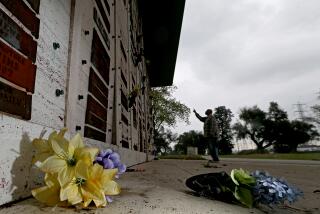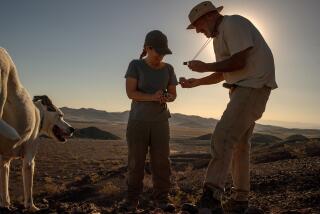New Arkansas Law Seeks to Protect Ancient Artifacts : Antiquities: Amateur archeologists protest that excesses of grave looters unfairly punish them.
- Share via
LITTLE ROCK, Ark. — Bill Wilkie is indignant.
For years, he has dug up Indian artifacts for his collection; he used to sell pieces he found. Now the state is telling Wilkie and other amateur archeologists that they can’t dig everywhere, and they can’t do it for profit.
“If it’s not right for me to go out an dig up an Indian, it’s not right for anyone to go out and dig up an Indian. And it’s ridiculous for me not to be able to sell a piece of pottery,” Wilkie said.
That is precisely the effect of Arkansas’ Act 753, which was passed this year to expand protections for graves in unregistered sites such as Indian burial grounds, Civil War battlegrounds and pioneer and slave graveyards.
The law also makes it illegal to buy, sell or barter in human skeletal remains or grave goods, or to display human skeletal remains for profit.
“Why would the state condone digging up human burials?” asked professional archeologist Dan Morse, at the site of a dig in southeastern Arkansas. “The only apparent reason I see motivating these people is greed. They want to dig up pots to sell.”
Trading in American Indian artifacts can be lucrative, said consulting archeologist Martin McAllister. His Missouri-based Archeological Resource Investigations has a federal contract to teach law enforcement agencies how to spot “pot hunters,” the term for unscrupulous diggers.
“There are people who are full-time commercial looters, with homes and cars and kids in school, and their only source of income is illicit collection of artifacts,” McAllister said.
A prehistoric pot from the Southwest that sold recently at a New York auction for $95,000 might have brought $400,000 in Europe, he said.
The treasure spurs indiscriminate digging. Jean Hartfield of Carriere, Miss., recalled one site near the Mississippi Gulf Coast.
“We found what looked like bomb craters where he’d been digging. He left human bones strewn all over the place,” said Hartfield, who this year spent her 10th summer with the Arkansas Archeology Survey training program.
The survey, part of the University of Arkansas system, is responsible for maintaining records on archeological sites and helping to preserve them.
For decades, sites in northeastern Arkansas have provided looters with valuable art and artifacts from prehistoric American societies.
The tribes, possibly the Quapaw and others, lived in densely populated, complex societies with great chieftains and elaborate settlements, said archeologist Anne Early at Henderson State University in Arkadelphia. Finely crafted pottery and various other works of art often were buried with the dead.
The Arkansas law is not the first of its kind; Indian groups have prompted other state legislatures and the federal government to enact similar laws.
The 1979 federal Archeological Resource Protection Act forbids the digging of burial grounds on federal property, with sentences of up to five years in prison and fines of $250,000. And the new federal Native American Grave Protection and Reparations Act provides criminal penalties for trafficking in Indian burial items.
The first offense under the new Arkansas law is a Class A misdemeanor, punishable by up to a year in the county jail and up to a $1,000 fine. Subsequent offenses are considered Class B felonies, punishable by up to 6 years in state prison and up to a $10,000 fine.
“You can pass a law against murder but that’s not going to stop it,” said Morse, the archeologist. “We don’t know how serious the law enforcement people are going to take it.”
Morse draws a distinction between legitimate amateur archeologists and people who trash history for profit. He noted that amateurs had helped to map more than 75% of Arkansas’ more than 20,000 archeological sites.
But amateur diggers like Joe Shurtleff feel they are being persecuted under a law that they say draws false distinctions between them and the pros.
“It used to be satisfactory with the professionals, but not anymore. In fact, what most of the amateurs do anymore don’t seem to be right with them,” said Shurtleff, of Ashdown. “We’ve begun to read now that everything we do they call us looters and grave robbers. They didn’t used to do that. I feel insulted. I don’t think I deserve to be called a looter.”
Shurtleff says as a result, he has nearly given up his hobby of more than 30 years. And for him, it is a hobby; he says though he has occasionally sold items from his collection, he pursues relics for the fun of it and for their historical value, and keeps careful records of his digs.
The law, he says, is just too intrusive: “The biggest thing why I’m so bitter is, after all my years of experience I cannot legally dig an Indian grave on my own land, my own private land.”
But McAllister argues that landowners have no inherent right to dig up and sell artifacts from their property.
“The important part of archeology is not the objects,” he said. “The importance is the context in which the artifact is found.”
More to Read
Sign up for Essential California
The most important California stories and recommendations in your inbox every morning.
You may occasionally receive promotional content from the Los Angeles Times.










